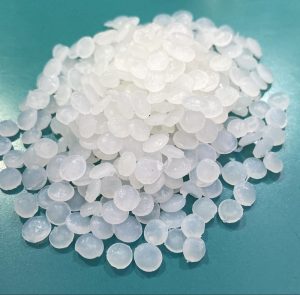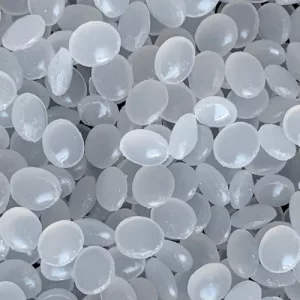Recycled LLDPE granule for injection and rotational molding
Recycled LLDPE granule for injection and rotational molding :Recycled Linear Low-Density Polyethylene (LLDPE) granules are an excellent choice for injection and rotational molding applications due to their flexibility, impact resistance, and cost-effectiveness. When using recycled LLDPE, it is important to ensure quality and safety while leveraging the material’s properties to meet product requirements.
Properties of Recycled LLDPE for Molding
Physical Properties:
- Density: 0.915–0.935 g/cm³, offering a balance of stiffness and flexibility.
- Melt Flow Index (MFI): Typically 0.5–10 g/10 min, depending on the process:
- Injection Molding: Higher MFI (6–10 g/10 min) for better flow in molds with complex geometries.
- Rotational Molding: Lower MFI (0.5–3 g/10 min) for better melt stability and uniform wall thickness.
Mechanical Properties:
- High impact resistance, even at low temperatures.
- Good elongation at break, ensuring flexibility and durability.
- Moderate tensile strength for structural integrity.
Thermal Properties:
- Melting temperature: ~120°C.
- Good thermal stability for high-temperature processing in both molding techniques.
Chemical Resistance:
- Resistant to chemicals, oils, and acids, making it suitable for industrial and consumer products.
Injection Molding with Recycled LLDPE
Injection molding is ideal for producing precise, detailed parts in large volumes.
Advantages:
- Recycled LLDPE flows well in molds, especially when compounded with flow enhancers.
- Its flexibility allows production of parts that are both durable and lightweight.
- High surface finish achievable with proper mold design.
Applications:
- Food containers, buckets, and lids (with food-grade recycled LLDPE).
- Packaging components.
- Consumer goods like handles and grips.
Considerations:
- Ensure a consistent supply of recycled LLDPE with uniform properties for stable production.
- Incorporate additives like slip agents and anti-static agents to enhance part functionality.
Rotational Molding with Recycled LLDPE
Rotational molding is ideal for creating large, hollow, or complex parts with consistent wall thickness.
Advantages:
- Recycled LLDPE’s low MFI supports slow heating and uniform material distribution.
- The material’s toughness ensures impact-resistant products.
- Excellent for lightweight, durable, and seamless designs.
Applications:
- Water tanks and storage containers.
- Playground equipment.
- Industrial bins and hoppers.
- Outdoor furniture.
Considerations:
- Use granules with low contamination to avoid issues with uniformity.
- For outdoor applications, incorporate UV stabilizers to protect against sunlight degradation.
Enhancing Recycled LLDPE Performance
To tailor recycled LLDPE granules for specific applications, consider the following additives and treatments:
- UV Stabilizers: Essential for outdoor products to prevent photo-degradation.
- Color Masterbatch: Custom pigments can mask the natural variability of recycled material.
- Impact Modifiers: Improve toughness for high-stress applications.
- Processing Aids: Ensure smooth processing during injection or rotational molding.
- Reinforcements: Blend with virgin LLDPE or HDPE to improve strength and consistency.
Challenges with Recycled LLDPE
- Consistency: Recycled material may have variability in melt flow, density, or color. Choose suppliers who provide certified, batch-controlled granules.
- Contamination: Residual impurities in recycled granules can affect product quality. Ensure granules are well-sorted and thoroughly cleaned.
- Mechanical Properties: Slightly lower compared to virgin LLDPE but can be enhanced with blending and additives.
- Regulatory Compliance: For food-grade or sensitive applications, ensure the material meets safety standards like FDA or EFSA.

Sustainability and Cost Efficiency
Recycled LLDPE is a cost-effective alternative to virgin material and supports eco-friendly manufacturing by reducing waste. Partnering with reliable recyclers ensures traceability and high-quality granules.
Choosing the Right Recycled LLDPE
When selecting recycled LLDPE for injection or rotational molding:
- Define the application (industrial, consumer, or outdoor use).
- Determine the processing method and required MFI range.
- Consider environmental conditions (e.g., UV exposure, mechanical stress).
- Test for compliance with applicable standards (e.g., ASTM, ISO, FDA for food-grade).
Why AMTOP?

AMTOP.co offers high-quality,customized LLDPE granule for injection and rotational molding , engineered for superior durability, chemical resistance, and environmental performance. Their innovative formulations ensure long-lasting, reliable pipes that meet global industry standards. With a commitment to sustainability and customer satisfaction, AMTOP is a trusted choice for pipe manufacturers worldwide.


